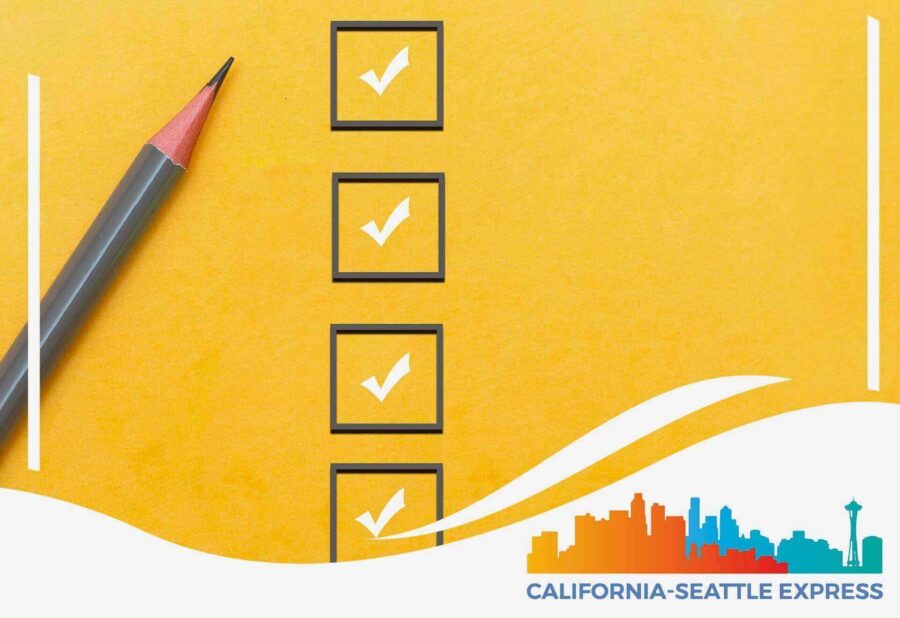Making the decision to move interstate is a big one, and there’s a lot of work that goes into it. Between finding a new place to live and getting your affairs in order, it can be easy to feel overwhelmed. That’s why we’ve put together this moving to another state checklist. It holds everything you need to do to make your move as stress-free as possible – so make sure to memorize it.

Moving to Another State Checklist Starts Two Months Before the Move
Initial relocation tasks should be completed around eight weeks before the desired date of the move. Many of them will be planning-related and require a lot of your research skills. Conducting thorough research is one of the most crucial items on your moving across the country checklist.
Whichever your relocation reasons may be, do extensive research on the area in which you intend to live as well as all the variables that might affect your quality of life. You shouldn’t rush into it – it is one of the major relocation mistakes people make during the relocation day preparation process.
Researching the cost of living in your future destination is essential but not the only task on this to-do list. Explore housing rates you’ll meet after relocating to a new city, but also the cost of groceries, schools, transportation, utilities, and so on. Remember that these expenses vary greatly between the cities, so you should look for a place that best matches your possibilities.
Another important thing to consider when relocating to another state is the job market. You want to be sure that there will be opportunities available in your field of interest. This kind of research will provide you with a better idea of what to expect in terms of salary and benefits once you relocate to a new home. Also, note that looking into the job market can also help you network with potential employers and even find a job before you move.
Visit a New City and Get To Know Your Neighborhood
If you’re considering an interstate move, one of the best things you can do is visit the area beforehand and get to know your potential new neighborhoods. This way, you can learn about their safety and the local amenities, meet some of the residents, get a feel for what it would be like to live there – and ultimately opt for the area that suits you the most.
If you’re not able to visit the city in person, there are still plenty of ways to get to know your new neighborhood. Try searching online for forums or social media groups dedicated to residents of the area. You can also look up information about the local schools (if you’re relocating with kids), parks, and other public facilities. Once you’ve decided on a neighborhood that you like, the next step is to start planning your move.
Make a Relocation Budget
While there are many costs associated with relocation, some of the most common include:
- Housing costs: rent or mortgage, security deposit, utilities,
- Transportation costs: gas or plane tickets,
- Packing and shipping costs.
In addition to these typical relocation expenses, some unexpected costs may also pop up. That’s why it’s important to have a cushion in your budget for anything that comes up unexpectedly.
Remember that only after making a relocation budget will you get a better picture of how to organize a move. Many important decisions will, in fact, depend on how much money is at your disposal – including whether you can hire movers from Seattle to California or movers from California to Seattle.

Moving Out-Of-State Checklist Tasks to Tick Off Six Weeks Before the Move
Six weeks before the move, you need to have a relocation date in mind. A date is crucial for hiring movers, switching utilities on and off, scheduling the assistance of friends, and more. After you set the date, it’s time to start making arrangements. They will differ depending on whether you plan on getting long-distance moving services or not.
If you count on the assistance of cross-country movers, you won’t have to plan out the trip to your future destination. Otherwise, you should rent a relocation truck, search the routes, explore possible detours, and so on.
Residential Relocation Service
Feeling rushed about your long distance move? We can help you organize and budget so you have everything in place.
Packing Services
Our professional packers have methods and techniques to ensure all your items are intact during and after the move.
Car Shipping Services
We can ship your vehicles using the best freight options available. Your car will be moved safely and securely and arrive as planned.
Research and Hire a Long-Distance Moving Company
Because of the many challenges cross-country moves bring, people usually opt for getting professional help. However, before choosing a relocation company, you must ensure it’s the best fit for you.
When you’re researching a cross-country moving company, it’s important to look for a professional experience with your particular type of move. Whether you have a corporate relocation or residential one, or you’re relocating from an apartment or house, you’ll want to find a mover that has experience with that type of move.
Once you do, it’s important to look for testimonials and reviews and see the experience other customers had with the company in question. If the relocation team is accredited with BBB, look at reviews on this site as well – it’s one of the best ways to avoid relocation scams.
Finally, when you’re ready to choose a long-distance mover, it’s important to get quotes from multiple companies. This will help you compare prices and services so that you can find the best deal for your needs. For a smooth and hassle-free move, choose a company that offers plenty of additional services, such as car shipping, packing, or storage services – and forget about these tasks.
Start Decluttering Your Current Home
When you start packing, decluttering your home, and getting rid of everything you’ve been storing but never utilizing will help. Any stuff you believe you won’t need in the future can be sold, donated to those in need, or thrown out. Decluttering will not only save your time and energy when the packing time comes but also money – note that companies typically charge based on the weight on your inventory list.
Here are some examples of things that should be decluttered before the relocation day:
- Old clothes that you no longer wear or those that don’t fit anymore,
- Books that you have read and will never read again,
- Furniture that is old and worn out,
- Kitchenware and appliances that are no longer used,
- Decorations and knick-knacks that are no longer needed or wanted,
- Multiple items of the same type,
- Things you keep out of guilt or obligation.
Figure Out an Effective Packing Plan
One of the most important aspects of any move is packing; if you do not pack properly, your belongings could be damaged or lost during transport. That’s why it’s important to plan a packing strategy before you start boxing up your belongings.
Consider packing non-essentials first – anything that you won’t need in the days before the relocation can be packed a week before the move. Relocation essentials, on the other hand, should be loaded last since you’ll need them during the trip and the first few days in a new home.
If you don’t want to get a professional packing service, here are some key long-distance moving tips to help you pack and move efficiently:
- Make a list of everything that you need to pack – This will help ensure that you do not forget anything essential and also give you an opportunity to consider what other items would be nice to have on hand. There are a few different ways to approach making your packing list. The simple one is to sit down and brainstorm everything you plan on bringing, categorizing items as you go.
- Group items together by type – When packing for a move, it is important to group items together so that they are easy to find and transport. This can be done by creating a packing plan that groups items by room or by type. It will be easier to unpack and find items when you arrive at your new home.
- Don’t overpack boxes – Packing boxes to the brim is not only inefficient, but it’s also dangerous. Boxes that are overloaded are more likely to break open, spill their contents, and damage your belongings. They’re also much harder to lift and move – which can lead to back injuries or other accidents.
- Label all boxes with their contents – This will help you keep track of what’s inside each box and make unpacking a lot easier. Additionally, make sure you label boxes with fragile items, so movers know which containers need to be treated more carefully.
- Invest in good quality packing materials – Many people choose to save on relocation costs by using whatever they have around the house. However, this is often a false economy – cheap materials are more likely to break, and if something does go wrong, it can be very costly to replace the damaged goods. It’s much better to invest in good-quality packing supplies, which will protect your belongings and make the whole process easier.
Additionally, ensure you research which items movers can’t move. There is a list of items prohibited from the back of the relocation truck – know all about it before you start packing.

There Are Many Tasks You Should Finish One Month Before the Move
By now, you’ve already made the majority of the crucial choices and completed essential tasks. However, there are more essential things left to be done before the relocation day comes.
Organize All Important Documents in Your Current Home
Organizing important documents before the move can be an overwhelming task, but it’s crucial in order to have important papers neatly preserved. Start by gathering all the paperwork in one place and sorting the documents into categories. This will make it easier to find what you need when you need it. Shred everything you no longer need and make the rest part of your relocation essentials.
Notify Everybody About Your Relocation
Inform family, friends, colleagues, and other important people in your life about the move. You may also want to notify your doctor, dentist, and other important service providers of your move. Of course, don’t forget about important institutions such as financial companies you’re doing business with, insurance providers, IRS, and the like.
Schedule the Transfer of All Your Utilities and Forward the Mail
Forwarding mail is easy – you only need to go to USPS’s website and select the day and address you want. However, you must also notify your utility providers – internet, water, sewage, electricity, and gas providers need to know when to cancel services in your old home and install them in your new one. Schedule a transfer or installation date if you already have a new address in your new state – take a look at the video below to see relocation tips on how to do it.
You’ll Have a Few Tasks to Finish Up Two Weeks Before the Move
Relocation day is approaching fast, and it’s time to make more detailed plans for relocation day, such as:
- Transferring renter’s insurance – if you are renting, contact your insurance provider to transfer your coverage from your old home to the new one, effective as of the move-in date.
- Verify with the relocation company – verify all last-minute information and plan the exact time of the crew’s arrival and departure.
- Scheduling sitters – if you have kids or pets, you must ensure they are taken care of and safe on the relocation day.

A Week Before the Move Also Comes With a Few Things to Do
One week before the relocation is the time to clean the oven, defrost your freezer, scrub the baseboards, clean your furniture, and prepare all of your belongings for the move. You should also secure cash for tipping movers (if you end up satisfied with their work) and in case of emergency.
If you drive, make sure your vehicle is in good condition and clean – even if you plan on shipping it professionally. Additionally, this is the time to put the finishing touches on your packing before the arrival of the relocation truck.

Your Moving Day Is Here, so Finish Up and Say Goodbye to the Old Home
It’s finally time to move into your new home! The long-distance movers are coming, and you’ve just got a few things left to do before they arrive. Make sure you’ve finished packing everything up, cleaned the old place from top to bottom, and said your goodbyes. Go through one last walkthrough of your home to see if anything is forgotten, lock the doors, and start your new adventure!




